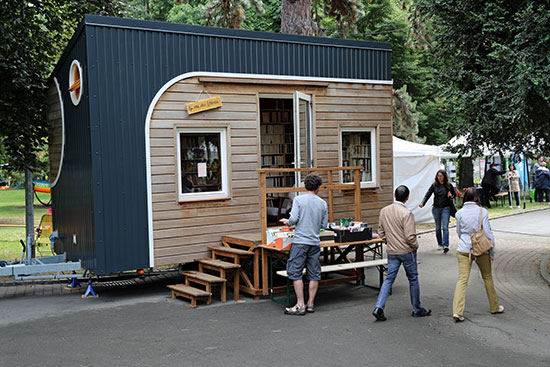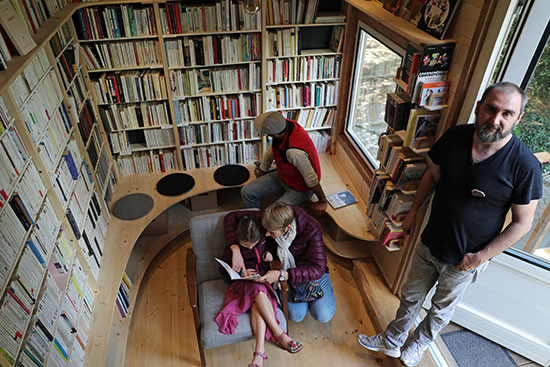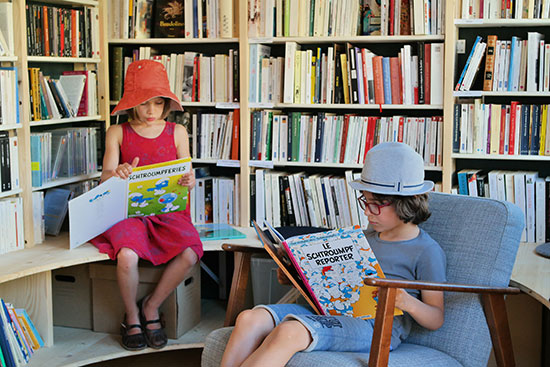“车轮上的书屋”在法国农村走红

|
在谈到他的“流动书屋”时,让·杰奎斯·梅格尔·纽伯表示:“在这样一个据说人们的阅读量越来越少的时代,我想给大家一个解决方案。”他的流动书屋有一个洋气的法国名字:“Le Vrai Chic Littérère”,翻成中文,意为“一间真正别致的小书屋”。 2015年4月,47岁的梅格尔·纽伯辞去了艺术总监的工作,打算开一家专营艺术的“文化茶馆”,让游客一边品尝咖啡茶点,一边阅读、交谈和听音乐。“后来我放弃了这个想法,因为我不想等着人们来找我,我想去主动找他们。” 梅格尔·纽伯意识到,要想更好地“送艺术下乡”,让文学作品更容易被偏远地区和低收入群体接受,外型上的包装也是很重要的。于是他决定在一间小房子里开一个二手书店。他表示:“我需要一个让人们一看就想进来的地方。” |
“In a time when people say that [folks] are reading less and less and that books are expensive, I wanted to propose a solution,” says Jean-Jacques Megel-Nuber when discussing his mobile bookstore: Le Vrai Chic Littérère, which literally translates from French to English as “the true chic literature.” Back in April 2015, the 47-year-old quit his job as an artistic director, with plans to open a “cultural bistro” dedicated to the arts, offering visitors the chance to mingle, read, and listen to music with a side of coffee and light bites. “I abandoned the idea because I did not want to wait for people to come to me,” he says. “I preferred to be the one to go to the people.” Ideally seeking to make literature more accessible to folks both geographically and financially, Megel-Nuber realized that his business’ overall appeal also depended on the look of his venue. So, he set out to open his second-hand bookstore in a tiny house. “I needed a place that makes people want to enter,” he says. |

|
为了让他的小书屋更有新奇感、创意感和情趣感,梅格尔·纽伯打算给它安几个轮子。为此,他找到了一家名叫La Maison Qui Chemine(意思是“会走路的房子”)的公司帮他实现这个梦想。这家公司位于法国,专门在法国各地帮人打造会走路的房子。 这家“会走路的书店”是在2016年夏秋之际建造的,直到2017年2月1日才正式完工。在这之前,梅格尔·纽伯就把它带到了离那家公司只有5公里远的一个名叫莱斯瓦夫雷的小村子,参加了当地的圣诞集市活动。 从那时起,梅格尔·纽伯驾驶着这座会走路的小屋,走遍了法国东部的山山水水,期间在米路斯、科尔马和斯特拉斯堡等30个多个地方驻扎过。这座小屋平均每个月启程两次,在一个地方会待两天到两周不等,不过它最常出现的地方还是阿尔萨斯,毕竟梅格尔·纽伯的家就在这里。人们有时也能在弗朗什孔泰或者勃艮第见到它的身影。 下一站,梅格尔·纽伯打算将它开到罗什让地区。“这个地方位于山区,海拔大约在1000米左右。‘她’将参加一个儿童的节日,到时一定会受到欢迎的。” |
Adding a level of novelty, creativity, and accessibility to the concept, Megel-Nuber decided to make the tiny house even more special by building it on wheels. To do so, he enlisted the help of La Maison Qui Chemine (“the house that walks”), a French company that conceptualizes and builds tiny houses on wheels all over France. The itinerant bookshop was built during the summer and autumn of 2016, but officially completed on February 1, 2017. Before then, Megel-Nuber took it on its first run to Les Voivres, a village roughly five kilometers from the workshop where it was being built, to be part of a local Christmas market. Since then, the structure, which Megel-Nuber drives around the East of France, has stopped by approximately 30 different destinations, including Mulhouse, Colmar, and Strasbourg. It travels on average twice a month and stays in a certain location between two days and two weeks but is mainly stationed in Alsace, where the bookseller himself lives. Fans can sometimes spot it in Frenche-Comté and Burgundy as well. Next on the literary tour: Rochejean. “It is in the mountains, about a thousand meters above sea level,” Megel-Nuber says. “She will be welcomed as part of a festival for children.” |

|
梅格尔·纽伯表示,在选择目的地的问题上,自己并非是完全有决定权的。一些城镇或村庄会直接与他联系,然后自己会决定是否接受他们的邀请。这样一来,他就不必担心在庆典活动上能不能拿到停车许可的问题了,因为邀请他的城市自然会搞定这些事情。他表示:“有些地方会邀请我的流动书屋去参加节日庆典或文学活动,他们会允许我把它安装在(任何我被邀请去的地方)。” 现在,这家流动书屋已经有3000多本书了。这些书都是梅格尔·纽伯自己挑选的。“我是根据自己对作者、出版商和藏书的了解来选书的,不过有的时候也仅仅是因为某本书很漂亮,或者是它的主题很有趣。” 可是光靠发明和创意,能让一个商人走多远?真的会有游客来这里买书吗?梅格尔·纽伯表示:“那当然!”大多数人逛完了这间流动书屋,都会买上一两本书。不过也有顾客一次性就在这里买了“50磅”的文学作品。来逛流动书屋的客人五花八门,有想买书的,也有纯粹带着猎奇心理来的,还有的人只是单纯地为了到这间红遍法国的“网红书店”打个卡。 |
When it comes to selecting destinations, Megel-Nuber explains that the process doesn’t rest entirely in his hands: towns and villages reach out to him directly and he then considers whether to accept their invitation or not. This system allows him not to have to worry about securing permits to park his bookstore on wheels in a specific area as the festivals, markets, and cities that ask him to visit take care of it all. “I respond to requests from people who invite the bookstore to festivals or literary events,” he says. “They give me permission to install it [wherever it is that I’m being invited to].” Today, the shop is home to 3,000 books, which Megel-Nuber picks himself: “I choose them according to what I know of authors, publishers, collections but also because I find them beautiful or their theme interesting.” But inventiveness and an original concept can only take a businessman so far: are visitors actually buying books? “But of course!” Megel-Nuber says. Most head out with a single tome or two, he says, but there are some customers that have purchased up to “fifty pounds” of literature from inside the concoction. These customers run the gamut from folks looking to actually buy books to those interested in the discovery of “the unusual” and others yet who only really care about seeing one of the famous tiny houses that pepper France. |

|
虽然他的发明非常独特,不过梅格尔·纽伯表示,法国也有其他的流动书店。“但是到目前为止,还没有哪家流动书店是放在这样一间小屋里的。”有些人对这种商业模式很感兴趣,并且已经直接联系了梅格尔·纽伯本人。 走进这样一个“轮子上的小屋”(当然,它得用拖车拖着才能走),被几千本书包围的感觉是什么样的?当然是很奇特的感觉,但是也很“温暖”。梅格尔·纽伯表示:“大家的反应是很积极的。经常有人告诉我,他们离开(书屋)时,都有一种依依不舍的感觉,大家都很想在自己的花园里有这样一间小书屋。”(财富中文网) 译者:朴成奎 |
As eclectic as his creation is, Megel-Nuber acknowledges the presence of other traveling bookshops in France—”but, for now, none in a tiny house.” Individuals interested in pursuing a similar business model have reached out to Megel-Nuber directly. But what is it really like to step into a tiny house on wheels that’s attached to a trailer and be engulfed by thousands of books? Unusual, for once. But also “warm,” Megel-Nuber says. “The reactions are rather positive.” He goes on to mention one of his favorite responses: “I am often told that it is difficult to leave [the bookstore] and that they’d like to have the same thing in their own garden.” |













